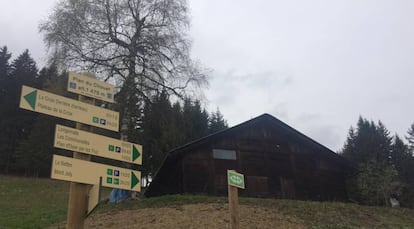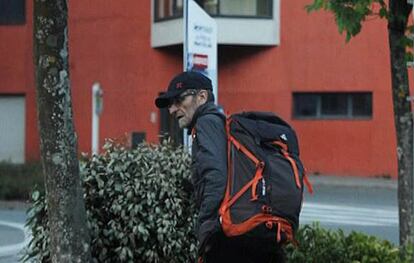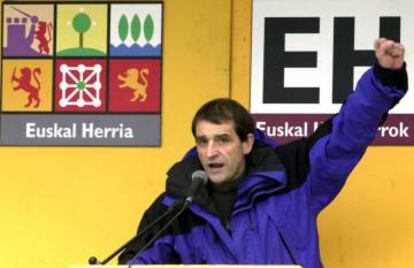A mountain hideout and a fake identity: How ETA’s Josu Ternera went unnoticed
Before his arrest in the French Alps last week, the former leader of the Basque terrorist organization had spent 17 years on the run after participating in some of the group’s bloodiest attacks

A mountain hut, a heavy backpack and a made-up biography: José Antonio Urrutikoetxea Bengoetxea, better known as Josu Ternera, was posing as Bruno Martí, a Venezuelan writer who had come to the region to find inspiration.
In reality he was a veteran ex-leader of the Basque terrorist organization ETA who had spent 17 years on the run after participating in some of the group’s bloodiest attacks.
Urrutikoetxea was arrested last Thursday in the parking lot of a hospital in the French Alps. He had spent the last six months in hiding, alone inside a mountain shelter at the foot of the Mont Blanc, at an altitude of over 1,200 meters.
Mountains are a land of acceptance. People here are rough, but we don’t spend our time wondering about our neighbors, we don’t make people take admissions tests
Jean-Marc Peillex, mayor of Saint-Gervais
After spending the first night in a cell in Bonneville, Urrutikoetxea was transferred to Paris on Friday. In 2017 he had been tried in absentia and convicted by a Paris court to eight years in prison for terrorist association. He is also wanted in Spain in connection with a bomb attack in Zaragoza in December 1987 that killed 11 people, including five children.
The former ETA leader was also behind a bomb attack against an Hipercor shopping center in Barcelona that same year that killed 21 people and injured 45. And in May 1991, ETA attacked the Civil Guard barracks in Vic, killing 10 people, five of them minors.
Four words
The arrest was made possible by a conversation that was overheard around two weeks ago by a Civil Guard officer sent to southern France to follow an “indirect” contact of Urrutikoetxea’s. The agent heard four words: “Jeudi 16 mai hôpital” (Thursday May 16 hospital). There was no clear indication that this was an appointment for Urrutikoetxea, or any reference to the specific hospital. But the police deployed patrols at several health centers in the area, as they suspected that he was hiding out somewhere in the French Alps.

Officers stationed at the Sallanches hospital quickly identified him as he stepped out of the passenger seat of a car at 7am. He was noticeably thinner than in the last available photograph of him, dating from 2013. The police said this was likely due to his strenuous mountain walks, not the cancer that he is suffering from. His appointment was for a check-up.
Remote hideout
Urritikoetxea had chosen his hideout well. There are very few homes in the Plateau de la Croix, located near a ski resort and a stone’s throw away from the borders with Italy and Switzerland. And most of these dwellings are closed during the low season.

In order to reach the last inhabited area of Saint-Nicolas-de-Véroce, which has a resident population of 250, it is necessary to drive up a steep one-lane road. And to reach the hut where Urrutikoetxea was hiding, one must hike on foot for 15 minutes on narrow dirt paths.
“To us he was Bruno Martí. He said he was from Venezuela and that he was a writer,” says one of the few residents of this isolated location.
The recent events came as no great surprise to Jean-Marc Peillex, the mayor of Saint-Gervais, a commune that encompasses the tiny Saint-Nicolas. “Mountains are a land of acceptance. People here are rough, but we don’t spend our time wondering about our neighbors, we don’t make people take admissions tests,” he says, speaking from his office. “That is why this land is well adapted to those who seek discretion.”
Vivianne, who runs the only general store in Saint-Nicolas that is open all year round, saw a picture of Urrutikoetxea in the local newspaper, Le Dauphiné Liberé. Even though it was a file photo from 2002, there was no doubt in her mind: “It’s him.” She says she had noticed that “friendly, polite” customer who always walked into the store with a backpack. He had been coming since February, although lately she had not seen him so much.
Another resident of the Plateau de la Croix, some three kilometers uphill from Saint-Nicolas, estimated that Urrutikoetxea had been in the area around six months. Sources at Spanish counter-terrorism services mentioned the same timeframes.
The few people who admitted to having had contact with him said he used to travel everywhere on foot, despite the long treks and steep terrain. For longer distances, like the hospital visit to Sallanches that resulted in his arrest, a car was required. A local resident gave him a ride to the parking lot where he was detained despite his attempts at convincing the French intelligence services (DGSI), in a fluent French, that he was not the individual they were looking for. He was not armed at the time of his arrest, and was carrying €4,000 in cash inside his backpack.
English version by Susana Urra.
Tu suscripción se está usando en otro dispositivo
¿Quieres añadir otro usuario a tu suscripción?
Si continúas leyendo en este dispositivo, no se podrá leer en el otro.
FlechaTu suscripción se está usando en otro dispositivo y solo puedes acceder a EL PAÍS desde un dispositivo a la vez.
Si quieres compartir tu cuenta, cambia tu suscripción a la modalidad Premium, así podrás añadir otro usuario. Cada uno accederá con su propia cuenta de email, lo que os permitirá personalizar vuestra experiencia en EL PAÍS.
¿Tienes una suscripción de empresa? Accede aquí para contratar más cuentas.
En el caso de no saber quién está usando tu cuenta, te recomendamos cambiar tu contraseña aquí.
Si decides continuar compartiendo tu cuenta, este mensaje se mostrará en tu dispositivo y en el de la otra persona que está usando tu cuenta de forma indefinida, afectando a tu experiencia de lectura. Puedes consultar aquí los términos y condiciones de la suscripción digital.








































